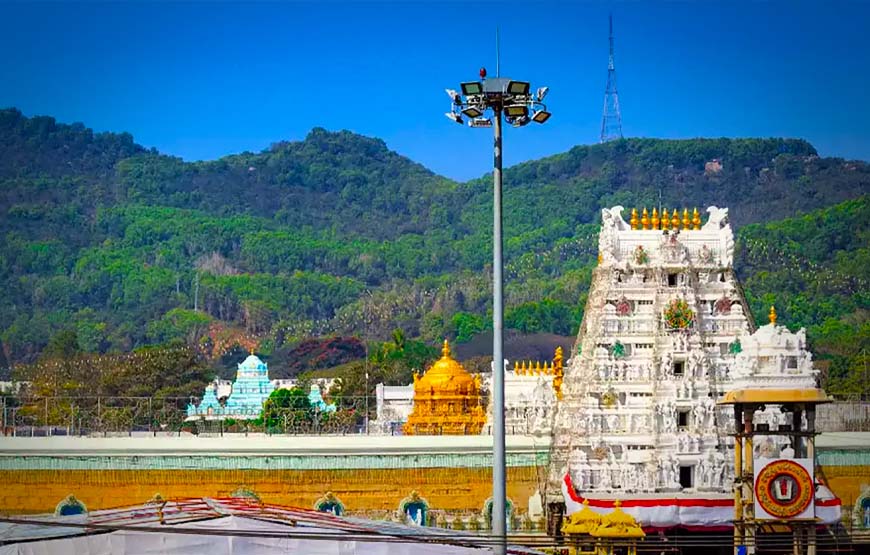Tirupati: The Sacred Abode of Lord Venkateswara
Tirupati, nestled in the lush hills of Andhra Pradesh, is one of the most significant spiritual destinations in India. Known as the abode of Lord Venkateswara, an incarnation of Lord Vishnu, Tirupati attracts millions of devotees each year. The town’s divine aura, coupled with its rich cultural and historical significance, makes it a must-visit for pilgrims and spiritual seekers alike. From the sacred rituals at the renowned Tirumala Venkateswara Temple to the serene beauty of its surroundings, Tirupati offers a deeply enriching spiritual experience.
The Spiritual Significance of Tirupati
According to Hindu mythology, Lord Venkateswara descended to Earth to guide humanity during the Kali Yuga. The Tirumala Hills, where the temple is located, are considered to be a physical manifestation of Lord Adisesha, the serpent on whom Lord Vishnu rests. The temple’s sanctity and the belief in Lord Venkateswara’s blessings have made it one of the most visited and wealthiest pilgrimage sites in the world.
The Divine Temple Complex
Tirumala Venkateswara Temple
Perched atop the Tirumala Hills, this temple is the heart of Tirupati’s spiritual life. The intricate architecture, adorned with gilded gopurams and sacred motifs, is a testament to ancient South Indian temple design. The presiding deity, Lord Venkateswara, is lovingly called Balaji by devotees. The darshan of the Lord is an unforgettable experience, as devotees feel the divine presence in every aspect of the temple.
Key highlights of the temple include:
- Suprabhatam Seva: The early morning ritual of waking up the deity with Vedic chants.
- Hair Tonsuring: Pilgrims offer their hair as an act of devotion and surrender.
- Laddu Prasadam: The iconic sweet offering, which has become synonymous with the temple.
Padmavathi Devi Temple
Situated in Tiruchanur, near Tirupati, this temple is dedicated to Goddess Padmavathi, the consort of Lord Venkateswara. Visiting this temple is considered essential for completing the pilgrimage.
Govindaraja Swamy Temple
This ancient temple, dedicated to Lord Vishnu, is known for its magnificent architecture and spiritual ambiance. It is one of the most prominent temples in Tirupati.
The Pilgrim Experience
Tirupati is not just about visiting temples; it’s about embracing the spirit of devotion and tradition. The journey to the temple is itself a sacred experience.
The Sacred Trek to Tirumala
Devotees often choose to climb the 3,500 steps of the Alipiri or Srivari Mettu paths to reach the Tirumala temple. This trek, spanning 9 to 11 kilometers, is a spiritual act of penance and devotion, with breathtaking views and serene surroundings.
Tonsure Ritual
One of the most unique aspects of a Tirupati pilgrimage is the tonsure ritual, where devotees shave their heads as an offering to the deity. This act symbolizes shedding ego and surrendering to the divine.
The Laddu Connection
The laddu prasadam of Tirupati is legendary. The sweet, prepared in large quantities, is not only a treat but also a sacred blessing from the temple.
Exploring Beyond the Temples
Tirupati’s charm extends beyond its temples, offering visitors a chance to explore its natural and historical treasures.
Chandragiri Fort
A historical gem near Tirupati, this fort was once the capital of the Vijayanagara Empire. Its well-preserved architecture and stunning views make it a fascinating detour.
Sri Venkateswara National Park
This lush reserve is home to diverse flora and fauna, including leopards, deer, and rare bird species. It’s a perfect escape for nature lovers.
Papavinasanam Waterfalls
Believed to cleanse sins, these serene waterfalls near Tirumala are a popular spot for pilgrims and tourists alike.Practical Tips for Travelers
- Best Time to Visit: The months between September and February offer pleasant weather. Special occasions like Brahmotsavam attract large crowds.
- Dress Code: Modest attire is mandatory for entering temples. Men are advised to wear dhotis and women to wear sarees or salwar suits.
- Accommodation: Pilgrims can choose from a range of options, including temple-managed guesthouses and hotels.
- Advance Booking: Book darshan tickets and accommodation well in advance to avoid last-minute hassles.


13 Comments